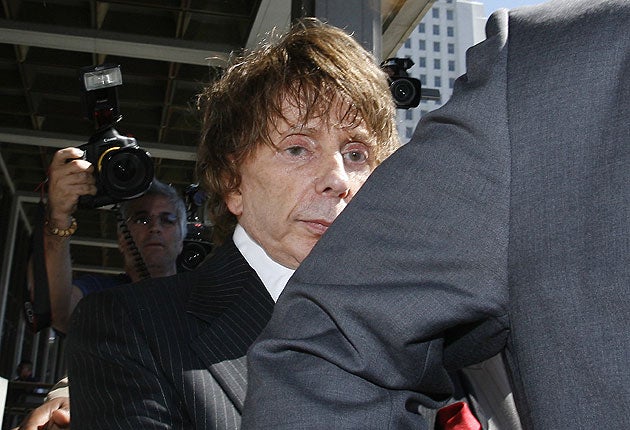Final arguments ready in Spector murder retrial

Your support helps us to tell the story
From reproductive rights to climate change to Big Tech, The Independent is on the ground when the story is developing. Whether it's investigating the financials of Elon Musk's pro-Trump PAC or producing our latest documentary, 'The A Word', which shines a light on the American women fighting for reproductive rights, we know how important it is to parse out the facts from the messaging.
At such a critical moment in US history, we need reporters on the ground. Your donation allows us to keep sending journalists to speak to both sides of the story.
The Independent is trusted by Americans across the entire political spectrum. And unlike many other quality news outlets, we choose not to lock Americans out of our reporting and analysis with paywalls. We believe quality journalism should be available to everyone, paid for by those who can afford it.
Your support makes all the difference.Six years after actress Lana Clarkson died of a gunshot wound at Phil Spector's hilltop mansion, lawyers will once again deliver final arguments to a jury in the legendary music producer's murder trial.
The question hanging over these proceedings is whether this jury, unlike the one at Spector's first trial 18 months ago, will be able to reach an unanimous verdict. The first panel deadlocked 10-2 in favor of conviction.
When closing arguments in Spector's retrial begin today, prosecutors will attempt to convince jurors that the 69-year-old music producer fired the fatal shot as Clarkson tried to leave his home. The defence will argue that Clarkson, a down-on-her-luck actress approaching middle age, put the gun in her mouth and pulled the trigger.
A change from circumstances presented to the first jury is a ruling Friday by Superior Court Judge Larry Paul Fidler that provides an option to convict Spector of a lesser charge. Fidler instructed jurors that involuntary manslaughter charges could be considered.
If Spector, who became famous for creating rock music's lush "wall of sound," is convicted of that charge, he could be sentenced to as little as two to four years in prison.
Prosecutors did not charge Spector with involuntary manslaughter, and district attorney spokeswoman Sandi Gibbons said they would still argue that he is guilty of second-degree murder, a conviction with a prison sentence of 15 years to life.
Loyola University Law School professor Laurie Levenson called Fidler's decision to allow a conviction on the lesser charge "a huge benefit for the prosecution."
"At this point, it ups the odds that the prosecution will walk away with some kind of a conviction," she said. "After all this effort, it's better than nothing."
Levenson said involuntary manslaughter is "an unintentional killing," and described second-degree murder as an act "with gross negligence and consciously taking the risk of killing someone."
Spector's lawyer, Doron Weinberg, argued against the judge's ruling, saying it would confuse the jury.
The first trial drew intense media interest but, like a TV rerun, the second one has been mostly ignored. Both television cameras and celebrity journalists were absent this time as most evidence was rehashed.
Clarkson, who had a cult following for her starring role in the 1985 film "Barbarian Queen," met Spector in February 2003 at the House of Blues nightclub, where she worked as a hostess. She agreed to accompany him to his mansion, an estate built to resemble a castle in the Pyrenees mountains, but shortly after arriving, the 40-year-old actress was found shot to death in the mansion's foyer.
Spector's chauffeur testified that he drove the couple to the mansion and was waiting in the car when Spector came outside holding a gun and told him: "I think I killed somebody."
The defense challenged the chauffeur's account, concluding its case with testimony from a memory expert who said eyewitness accounts were not always right.
Prosecutors at both trials sought to paint Spector as a man who hated women and who frequently threatened them with guns. Spector did not testify.
Final arguments could continue until Wednesday, when the jury was expected to get the case.
Join our commenting forum
Join thought-provoking conversations, follow other Independent readers and see their replies
Comments